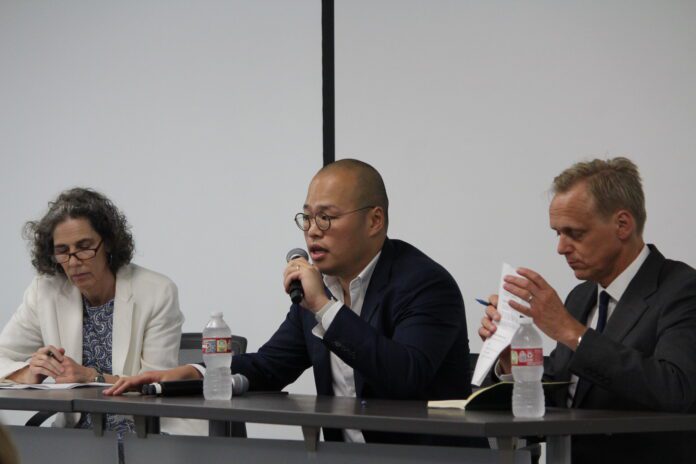In his play “The Clouds,” Aristophanes accuses Socrates of having his head in the clouds, self-absorbed and ignoring the common good of Athens. In doing so, Aristophanes expresses a central concern about the intellectual life, namely, that intellectuals disdain the life of their community.
Does a love of the ideal undermine the ordinary and practical? Could an orientation towards the highest truths, a principal goal of the University of Dallas’ education, undermine people’s concern for their political communities?
In the pagan world of Aristophanes, philosophy did indeed tend to oppose itself to concern for one’s particular community. Christianity, however, revolutionized our understanding of reality, bringing politics and philosophy into harmony. Because man’s ultimate good is a relationship with God, a Good that is both without limit and achieved in community, truly loving and honoring one’s family and political community does not conflict with the universal Good but is an essential part of it.
Because of our Catholic identity, we at UD understand that the particular concerns of politics must be subordinated to the natural law and ultimately directed toward the human telos of unity with God. When politics separates from this hierarchy, it morphs into ideology and ceases to serve the common good. In a godless philosophy, “independent thinking” may mean independence from respect for authority, but for UD, it means independence from the gods of worldly ideologies. It involves the freedom to judge the standards of our political community by those of the Church, not out of disdain for or apathy towards one’s political community, but out of love for it.
This freedom requires us to step back from the current ideological war between “left” and “right” and to look at politics from a Catholic perspective. In the modern world, with Christianity no longer forming the basis of political ends, both sides of the “political spectrum” have a heretical idea of the Good, inordinately exalting certain aspects while throwing out the rest. It will be helpful, therefore, to form an alternative “political spectrum” that considers what the conventional ones do not.
First, we must distinguish what I call the “personalist” regimes, which see every individual as an end, from the “collectivist” regimes, which see the individual as dispensable. Then, we must distinguish the “conservative” regimes, which see man’s end in embracing one’s roots and community, from the “liberal” regimes that see man’s end as found in progress and liberation from one’s nature and roots and in creation of a new fulfillment.
Combining the two measures, the personalist conservative regimes I call communitarian. Among the personalist liberal regimes falls liberal capitalism. Among the collectivist conservative regimes falls fascism. Finally, among the collectivist liberal regimes falls Marxism.
The Catholic understanding of human nature lies firmly in the communitarian category. The Church has a place for liberation from convention and community standards, but only in service of the human telos of union with our Creator, in whom our true roots lie.
For a Christian, our Alpha is our Omega. Likewise, our salvation is to be brought into the life of the Trinity, the divine Family, as part of the Mystical Body of Christ, the heavenly community. A politics that thus understands our social nature and telos will likewise foster rooted communities that support families and connect people to both nature and tradition, opening them to the end for which God created and chose them.
Today’s polarized political atmosphere, however, has little room for this politics. Not only do left and right pit elements of Catholic Social Teaching against each other, but they also both tend to make gods out of progress and liberation from one’s roots, promoting policies that undermine the family or the local community, fostering isolation and selfishness.
When a UD student sees political parties grouping anyone who points out such issues into the “enemy” camp, he may understandably be disillusioned. Of course, disillusionment with current politics should never lead to apathy, but rather to a search for better ways to serve the common good. In my experience, many of my fellow students who dislike contemporary politics do actively serve a community, namely, our little community of UD.
Recently, the political organization Young Americans for Freedom has started a new chapter on campus. If this organization hopes to inspire UD students to political action, it must guard against the ideological extremism and purism that places opposition to the “enemy” above a true pursuit of the common good, thereby finding no common ground with the other side.
In contemporary conservatism, for example, one often sees the Democratic Party condemned as Marxist, which often leads to a rejection of any elements of Catholic Social Teaching the party supports. If the UD YAF chapter truly wants to bring UD students to greater participation in politics, it must not treat the standards of any mere political ideology as absolute religious truth but must instead allow the true Faith to be the ultimate standard of a good political agenda.
